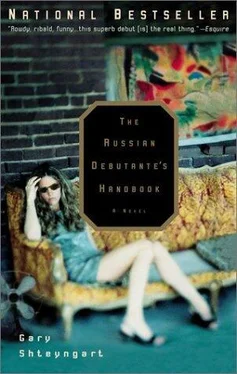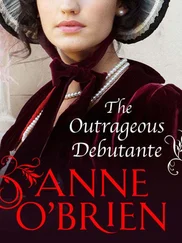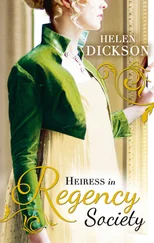Gary Shteyngart - The Russian Debutante's Handbook
Здесь есть возможность читать онлайн «Gary Shteyngart - The Russian Debutante's Handbook» весь текст электронной книги совершенно бесплатно (целиком полную версию без сокращений). В некоторых случаях можно слушать аудио, скачать через торрент в формате fb2 и присутствует краткое содержание. Город: New York, Год выпуска: 2003, ISBN: 2003, Издательство: Riverhead Books, Жанр: Современная проза, Юмористическая проза, на английском языке. Описание произведения, (предисловие) а так же отзывы посетителей доступны на портале библиотеки ЛибКат.
- Название:The Russian Debutante's Handbook
- Автор:
- Издательство:Riverhead Books
- Жанр:
- Год:2003
- Город:New York
- ISBN:0-7865-4177-6
- Рейтинг книги:4 / 5. Голосов: 1
-
Избранное:Добавить в избранное
- Отзывы:
-
Ваша оценка:
- 80
- 1
- 2
- 3
- 4
- 5
The Russian Debutante's Handbook: краткое содержание, описание и аннотация
Предлагаем к чтению аннотацию, описание, краткое содержание или предисловие (зависит от того, что написал сам автор книги «The Russian Debutante's Handbook»). Если вы не нашли необходимую информацию о книге — напишите в комментариях, мы постараемся отыскать её.
and
. The Russian Debutante’s Handbook Bursting with wit, humor, and rare insight,
is both a highly imaginative romp and a serious exploration of what it means to be an immigrant in America.
The Russian Debutante's Handbook — читать онлайн бесплатно полную книгу (весь текст) целиком
Ниже представлен текст книги, разбитый по страницам. Система сохранения места последней прочитанной страницы, позволяет с удобством читать онлайн бесплатно книгу «The Russian Debutante's Handbook», без необходимости каждый раз заново искать на чём Вы остановились. Поставьте закладку, и сможете в любой момент перейти на страницу, на которой закончили чтение.
Интервал:
Закладка:
Vladimir stood up. He sat down. He got up again. Anything for sensory experience. He sliced at his fingers with his business card for a bit, before presenting it to the poet. Very enjoyable. He was ready to plunge into the Tavlata.
“I’ll send you a starter kit with instructions,” Fish was saying. “And also some of my poetry.”
“I have fallen under the influence of John Donne,” he added, buttoning up his funky elfin tunic.
“SO, ARE YOUa good person?” Morgan asked.
It was five in the morning. After the party. An island in the middle of the Tavlata, connected to the Lesser Quarter by a single footbridge of uncertain origin; an isle that seemed all but abandoned by Prava’s vague municipal services; an overgrown jumble of mammoth trees and the little shrubs that clung to them the way baby elephants rub up against the feet of their mothers. They were sitting on the grass behind a tremendous oak with its boughs fully leafed despite the advance of autumn; this redoubtable old-timer welcomed in the passing seasons at his own discretion. On the other side of the footbridge, high above them, moonlight fell on the spindly buttresses of the castle’s cathedral, giving St. Stanislaus the appearance of a giant spider which had somehow scampered over the castle walls and settled in for the night.
The question was whether or not he was a good person.
“I have to preface this by saying I’m drunk,” he said.
“I’m drunk, too. Just tell the truth.”
The truth. How did it come to this? Just a minute ago he was kissing her alcohol-soaked mouth, feeling under her armpits for the wetness he loved, rubbing himself against her thigh, getting a voyeuristic excitement from the passing beam of his car’s headlights—devoted Jan was keeping an eye on them from the embankment.
“Speaking comparatively, I’m a better person than most I know.” This was a lie. He had only to think of Cohen to know he was lying. “All right, I’m not a great person per se, but I want to be a good person to you. I’ve been good to others in the past.”
What the hell kind of conversation was this? She was leaning against a rotting log next to some kind of sacrificial heap of used Fanta cans and condom wrappers; her hair was tangled with weeds; there was a lipstick smudge on the tiny, retroussé tip of her nose; and Vladimir’s dribble was hanging from her chin.
Was Vladimir a good person? No. But he mistreated others only because the world had mistreated him. Modern justice for the postmorality set.
“You want to be good to me,” she was saying, her voice surprisingly steady, even as she drunkenly tipped back and forth from the slightest breeze.
“Yes,” Vladimir said. “And I’d like to know you better. Unquestionably.”
“You really want to hear about what it was like to grow up in Cleveland? In a suburb? My family? Being the oldest child? The only girl? Um… Basketball camp? Can you fathom a girls’ basketball camp, Vladimir? In Medina County, Ohio? What’s more, do you even care? Do you want to know why sometimes I’d rather be out camping than in a café? How I hate reading other people’s poems just because I have to? And how I hate listening to people all the time like your friend Cohen when he starts going on about his damn Paris in the twenties?”
“Yes,” Vladimir said. “I want to know all of it. Absolutely.”
“Why?”
It wasn’t an easy question. There were no tangible answers. He would have to make something up.
While he was thinking, a brisk wind started and the clouds rolled northward, so that when he lifted his head straight up and ignored the fact that he was at the very epicenter of the city, it was possible to imagine the island afloat and traveling south, navigating the twists and bends of the Tavlata until it finally emerged in the Adriatic Sea. A little more sailing then and they could beach their island ship on the shores of Corfu; frolic amid the rustle of tiny olive trees, the harmonies of the goldfinches. Anything to survive this interrogation.
“Look,” Vladimir said. “You hate it when Cohen starts talking Paris and the whole cult of the expatriate. But I have to say: There is something to it. The most beautiful three lines in literature that I’ve ever read are the very last lines of Tropic of Cancer. Now let me lay down the caveats first: By saying what I’m saying, I’m not sanctioning the misogynist, race-baiting Henry Miller as a human being, and continue to cast grave doubts on his abilities as a writer. I am only expressing my admiration for the last few lines of this particular novel… Anyway, Henry Miller is standing by the banks of the Seine, he’s been through just about every kind of poverty and humiliation possible. And he writes something like (and excuse me if I’m misquoting): ‘The sun is setting. I can feel this river flowing through me—its soil, its changing climate, its ancient past. The hills gently girdle it about: its course is fixed.’”
He wiggled his hand in between her two warm palms. “I don’t know if I’m a good person or a bad person,” Vladimir said. “Perhaps it’s not possible to know. But right now I am the happiest man alive. This river—its soil, its climate, its ancient past—being with you at five in the morning in the middle of this river, in the middle of this city. It makes me feel—”
She pressed his own hand to his mouth. “Stop it,” she said. “If you don’t want to answer my question, then don’t. But it’s something I want you to think about. Oh, Vladimir! Listen to you! Not sanctioning some poor Henry Miller as a human being. I’m not even sure what you mean, but I know it’s not pretty…” She turned away from him, and he was left to stare into the stern little bun of her hair.
“Look, I like you,” she said suddenly. “I really do. You’re smart and sweet and clever, and I think you want to do right by people. You’ve really brought the community together with Cagliostro, you know. You’ve given a lot of people their first chance. But I feel that… in the long run… that you’ll never really let me into your life. I feel that after spending just one day with you. And I wonder if it’s because you think I’m just this idiot from Shaker Heights, or whether there’s something terrible you don’t want me to know.”
“I see,” Vladimir said. His mind was racing for an answer but there was little he could say that would make her believe him. Maybe, for the first time in a long time, it was best not to say anything.
On the bank opposite the castle, the first touches of dawn were setting light to the gold dome of the National Theater that flared above the black toes of Stalin’s Foot like a holy bunion; a tram full of early workers was crossing a nearby bridge with enough rumble to send tremors through their little isle. And just then the wind turned ugly, conspiring with Vladimir’s plan to wrap his arms around her. Her silk blouse provided poor traction for his embrace, but he could feel her, infinitely warm and solid and smelling of sweat and spent kisses. “Shh,” she whispered, guessing correctly that he was about to speak.
Why couldn’t she make this easy for him? Weren’t his lies and evasions valid enough? And yet, here she was, Morgan Jenson, a tender but unsettling prospect, reminding Vladimir of someone he used to be before Mr. Rybakov stumbled into his life with news of a world beyond Challah’s desperate grasp. A soft and unsurefooted Vladimir, whose mornings were crowned with a double-cured-spicy-soppressata-and-avocado sandwich. Mother’s Little Failure. The man on the run.
PART VI
THE TROUBLE WITH MORGAN
26. THE LONG MARCH
HE HAD NEVERseen such strong legs.
Читать дальшеИнтервал:
Закладка:
Похожие книги на «The Russian Debutante's Handbook»
Представляем Вашему вниманию похожие книги на «The Russian Debutante's Handbook» списком для выбора. Мы отобрали схожую по названию и смыслу литературу в надежде предоставить читателям больше вариантов отыскать новые, интересные, ещё непрочитанные произведения.
Обсуждение, отзывы о книге «The Russian Debutante's Handbook» и просто собственные мнения читателей. Оставьте ваши комментарии, напишите, что Вы думаете о произведении, его смысле или главных героях. Укажите что конкретно понравилось, а что нет, и почему Вы так считаете.












